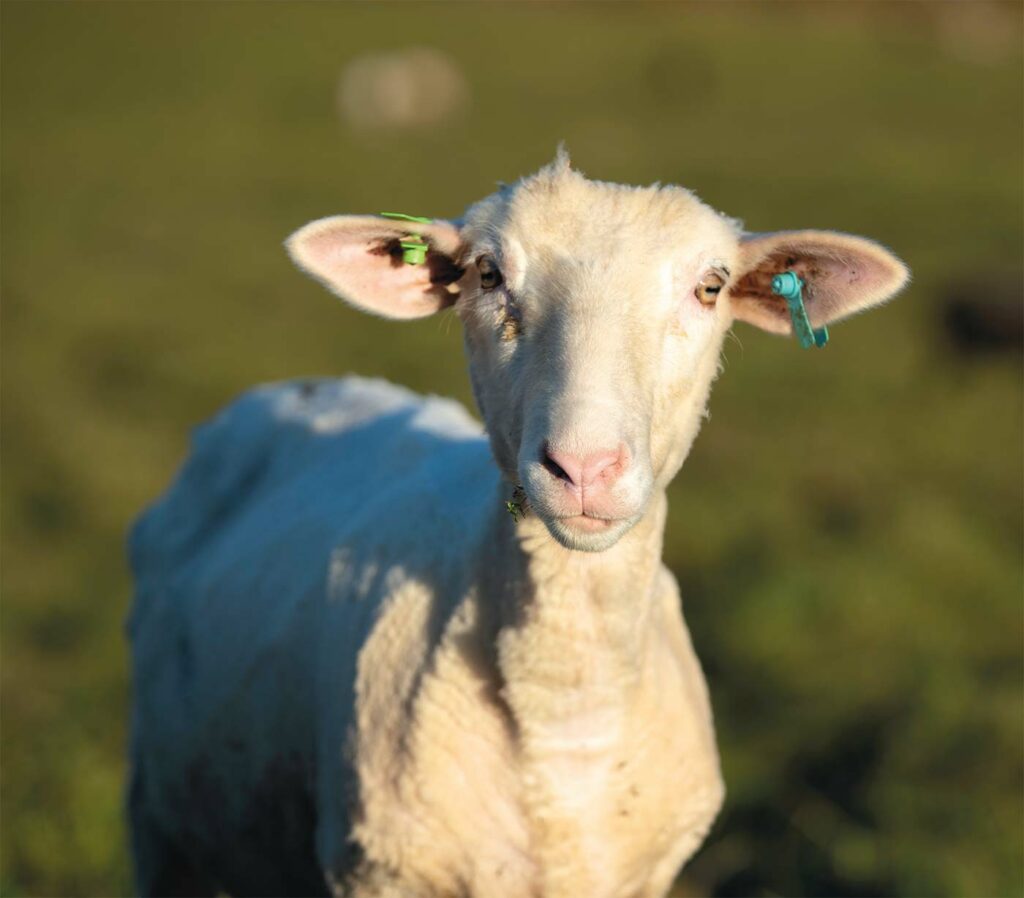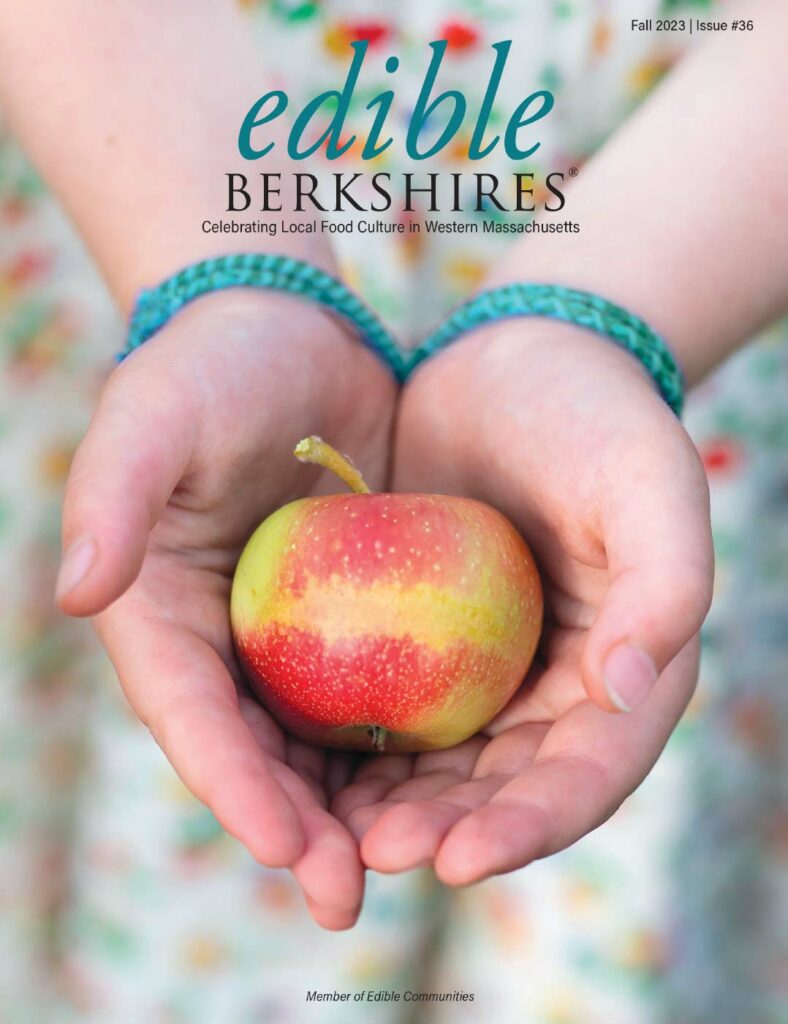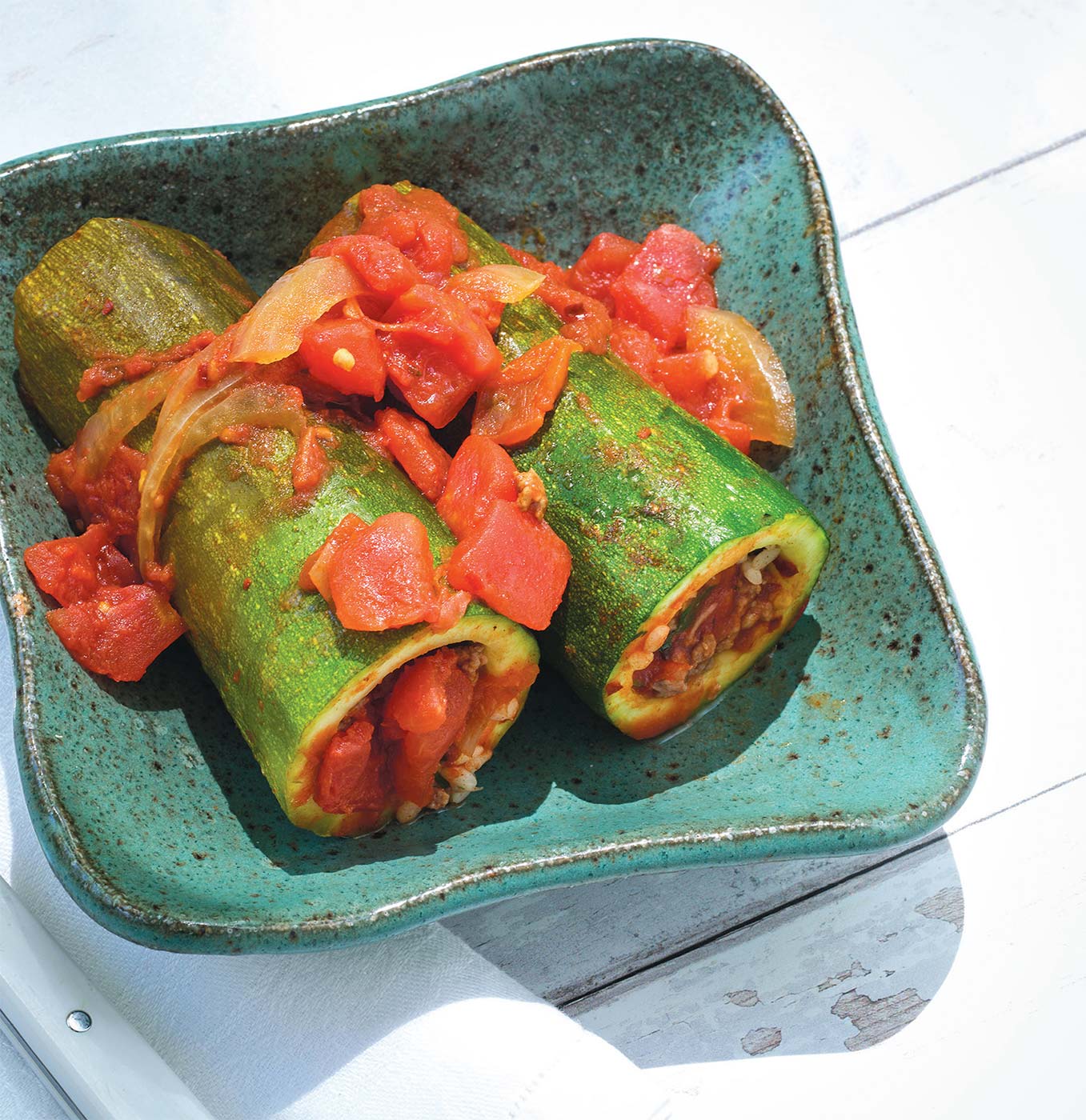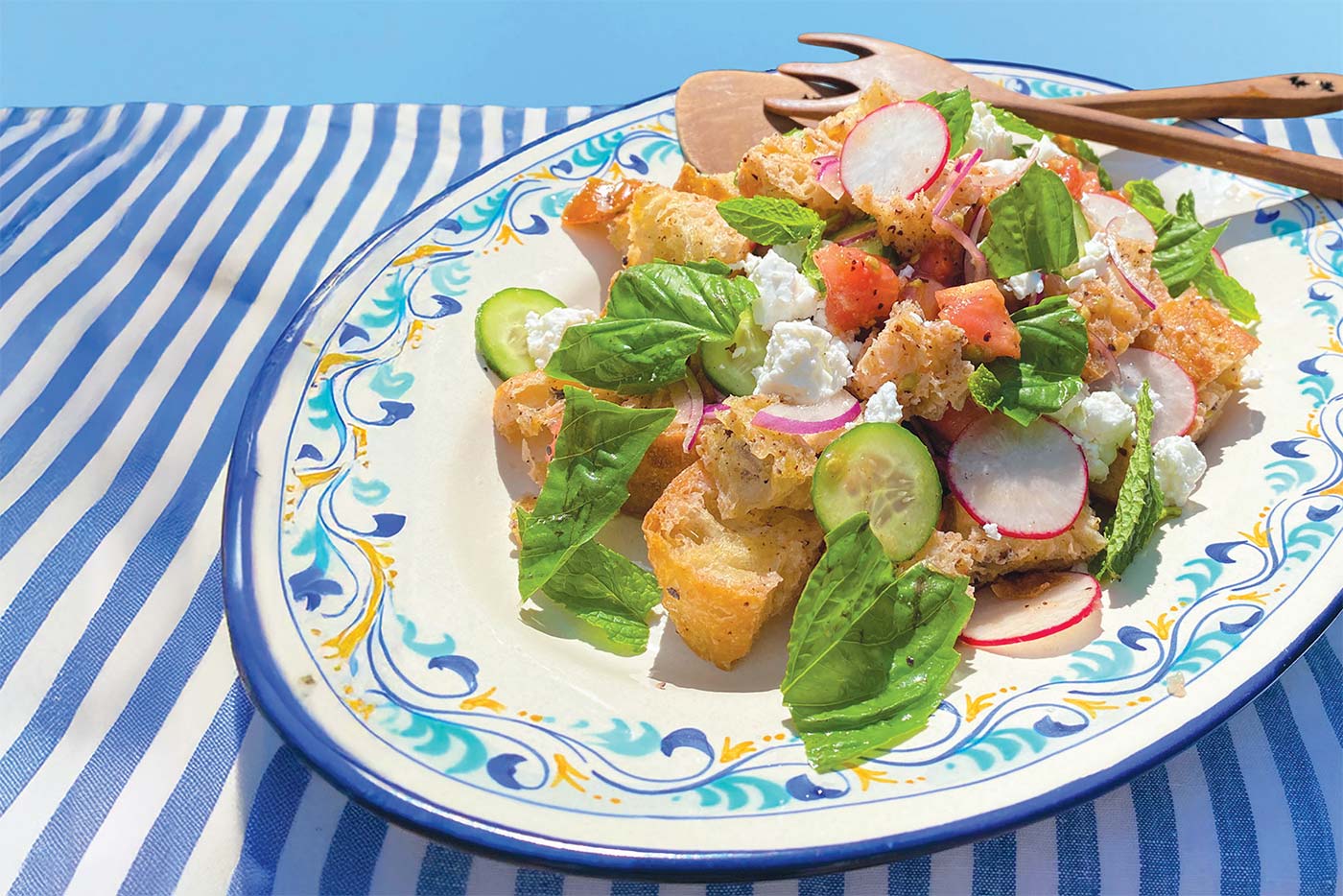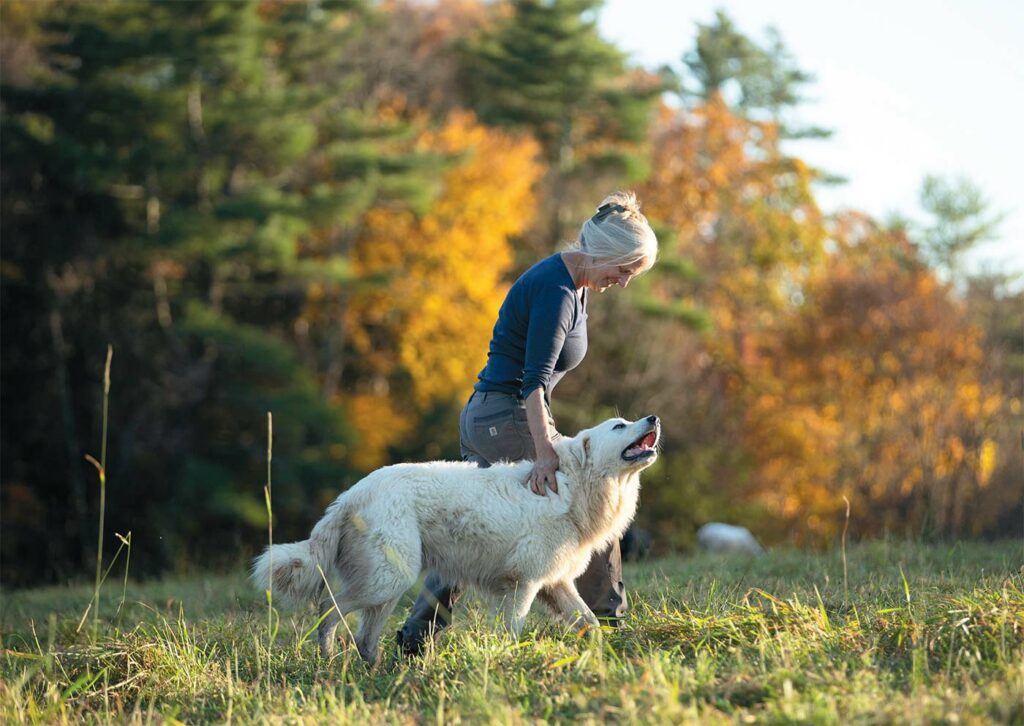
“People get a kick out of seeing the dogs work, which sometimes for people who are not informed translates to stopping, pulling out their cameras, and filming the dogs rushing the fence. The dogs waste energy dealing with humans when they should be watching for coyotes.” —Mary Berle
Mary Berle has clearly found her happy place. “I just love how the sheep are so peaceful,” she says, surveying her flock while leaning over to give her guardian dog, Thor, a scratch behind the ears and to whisper some reassuring words regarding a stranger in the pasture. I’m no threat, but the five dogs who stand watch over Mary’s 400 sheep are bred to be suspicious and vigilant. They are a combination of Great Pyrenees, Maremma, and Akbash, and they are the farm’s first defense against coyotes, who strike opportunistically when the dogs are distracted. “We wouldn’t have sheep without them,” says Mary.
Lila’s Mountain Farm was passed on to Mary by her mother, Lila Berle, three years ago, and comprises 420 acres that span three towns—Alford, Egremont, and Great Barrington. With its rolling hills and expansive views, it is, without a doubt, one of the loveliest farms in the Berkshires, but its location can be problematic. There are three roads that run right through the main part of the farm, and it’s a popular place for dog walkers and cyclists. And while Mary is pleased that people appreciate the farm, humans can be, well, a bit clueless. “People get a kick out of seeing the dogs work, which sometimes for people who are not informed translates to stopping, pulling out their cameras, and filming the dogs rushing the fence,” she says. “The dogs waste energy dealing with humans when they should be watching for coyotes.” In fact, she lost a sheep last summer in just that way. Her plea to admirers of the farm and the dogs: Enjoy your walk, but please keep walking.
Coyotes may be one of Mary’s biggest challenges, but they are certainly not her only one. As a relatively new steward of the farm, she is navigating the changing landscape of farming in the Berkshires. For her, that requires innovation and experimenting with new revenue streams while staying true to her mother’s vision, her own love of the land, and the animals it supports.
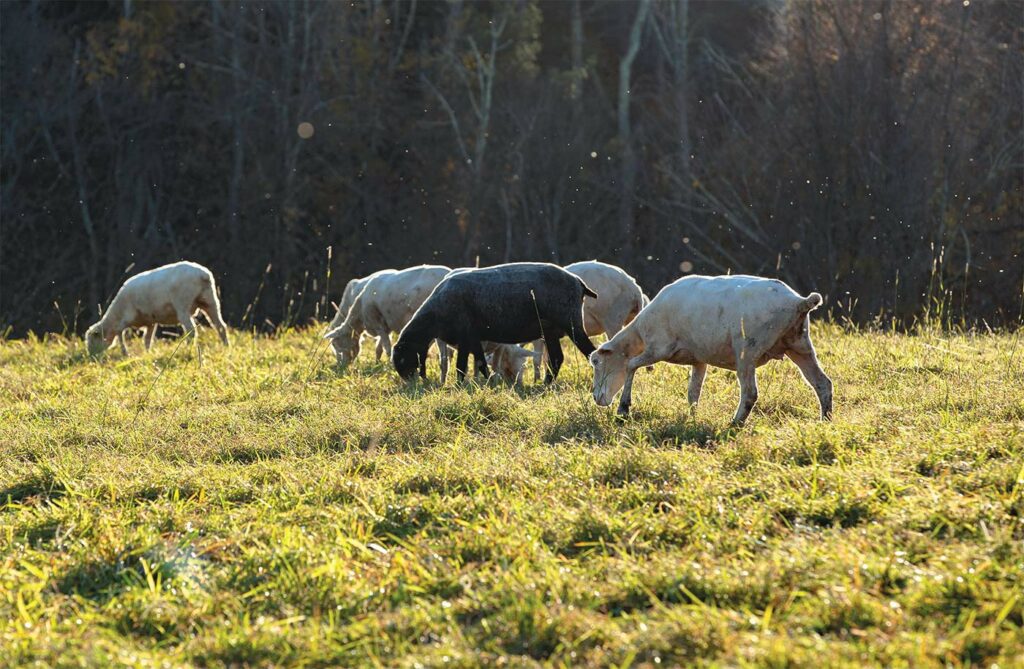
A FARM OF HER OWN
Lila Berle, 86, is the daughter of High Lawn Farm founders Colonel George and Marjorie Wilde, and the apple did not fall far from the tree. While it was Col. Wilde who received multiple cattle breeding awards, it’s now widely acknowledged that Marjorie was the driving force behind High Lawn’s Jersey cow breeding expertise. Her cows produced milk that’s prized throughout Massachusetts, New York, New Hampshire, and Connecticut. “My experience growing up was that there was never a time where you saw her without her cow books,” says Mary of her grandmother. “She named every single calf; it was extraordinary. She was one of the first people to recognize the importance of the maternal line.”
Lila and her husband, Peter Berle, an environmental lawyer, raised their four children on Sky Farm, on the north shoulder of Monument Mountain in Stockbridge. There were 50 sheep, Maremma guardian dogs, ducks, geese, and a big vegetable garden that fed the family, but Lila longed for a bigger project. When she was in her early 50s—not much younger than Mary is now—and her nest was empty, she had the opportunity to purchase what is now Lila’s Mountain Farm. She moved her sheep to those expansive pastures and immediately began growing the flock. “I bred with very strict standards,” says Lila. “I looked at body capacity, bare legs and face, and good udders. I bred them to be good mothers. All the things my mother did with cows, I did with sheep.”
The flock grew quickly, and it’s now been 25 years since sheep from outside the farm were required for breeding. Most breeders prioritize either meat or fleece, depending on their primary revenue stream. Lila, however, bred for both: She sold meat to local restaurants and wholesaled wool to a high-end blanket manufacturer. But when COVID hit, the restaurant business model evaporated almost overnight. “Lila had routines that she’d been in for a long time and, as we all know, that moment required innovation,” recalls Mary. After having run the farm for 34 years, Lila, then age 83, decided it was time to pass the torch. She had been a constant presence at the farm, relishing the physical labor it took to tend the sheep, make the hay, and keep the buildings in good repair. She deserved a break. So, in October of 2020, she called Mary. “Starting tomorrow, you’re in charge,” she declared.
While that call came as somewhat of a surprise to Mary, it was not unwelcome. She had spent her life as an educator—she was a teacher, then principal, at Muddy Brook Elementary in Great Barrington, and a chief educator at the Norman Rockwell Museum in Stockbridge. “I’ve had really wonderful jobs where I’ve really tried to make a difference,” she says. “But I was really ready for something new and the opportunity to be outside was very exciting.” Nonetheless, she stayed on at the Rockwell for a year after that call from Lila, working to keep public operations running at the museum, which did not close during COVID. She’d arrive at the farm early, then leave at 9 for her desk. Her three kids, all graduated from college, took advantage of COVID work-from-home flexibility, to help lamb that first year.
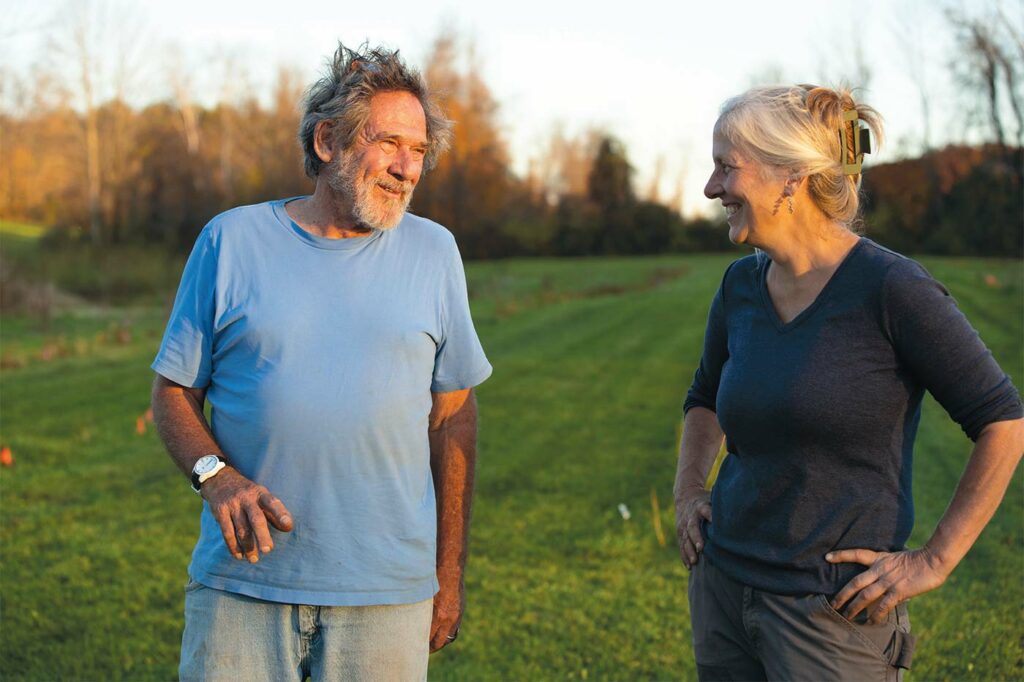
CHANGE TO SUSTAIN
Three years later, Mary has made the farm her own while staying true to Lila’s vision. And she is doing it pretty much on her own. Her partner, Len Tisdale, comes to the farm once a week to help, and Anthony Nordoff, an artist who rents a home on the property, can be counted on consistently to lend a hand. “There’s no question I need help, but I need cash flow,” says Mary. She’s working on that.
The farm remains free of chemicals and preservatives and typically yields enough hay to feed the sheep; and the sheep will always be bred for both wool and meat. Those breeding practices remain meticulous. But some things needed to change. “Lila’s prices for meat hadn’t changed in 20 years,” says Mary. “Simply put, expenses have gone up, and revenue needs to match that.”
Mary raised prices and explored different markets. Rather than selling whole lambs wholesale, she found a butcher in Connecticut with halal/kosher certification and expertise in packaging. She’s now selling directly to stores, such as Taft Farms, the High Lawn Farm retail store, and Bizalion’s. New York City distribution is also in the works. And she’ll sell directly to consumers who want 30 pounds of meat or more.
Mary also increased the number of guardian dogs from two to five. “Two were completely overwhelmed when I started,” she says. “And we were losing two sheep every night to coyotes.” With five dogs, the sheep are calmer, more secure, and release fewer stress hormones, and that’s important. Sure, happier sheep make better meat and fleece, but they also set the overall tone for the farm. When we stood among the flock in the farm’s “Bobolink Pasture” (named for the songbirds that nest there), I commented to Mary that I was shocked at how quiet and peaceful it was—not a single sheep was bleating. “When they know they’re cared for and their needs are met, they don’t complain,” says Mary. “That calm is worth so much.”
The concept of “worth” is a recurring theme at the farm; Mary is making her mark as a steward by diligently recognizing and leveraging everything of worth. A big part of her vision going forward involves fleece. While Lila wholesaled her wool to a high-end blanket manufacturer, Mary has something a little different in mind.
“I knew that we needed to own the supply chain or grow a supply chain with partners and not wholesale our wool,” she says. Mary partnered with Muriel’s, a small Grand Isle, Vermont, garment maker that collects wool from local sheep farmers and fashions it into sweaters.
The mother-and-son team, Laura and Cyrus Jacoby, produce their sweaters on a computerized 3D knitting machine, which allows them to produce at scale while providing farmers with an additional income stream. Mary sells wool to Muriel’s but also partners with the company to create her own Lila’s Mountain Farm brand of sweaters and vests. It’s a project near and dear to heart. Having a branded product is great for the farm’s identity, but the sweaters are also good for the environment. “Sheep actually sequester carbon as they grow their wool,” says Mary. And everyone involved—farmer, knitter, and consumer—can feel good about garments that have traveled just 200 miles, from farm to closet.
At this writing, Mary has just received her first big shipment and is preparing to showcase the woolen goods at local holiday markets (they’re also sold at Taft Farms). “They’re really thick and minimally processed,” Mary says. To test durability, she wore a sweater for 200 days straight. “I love it,” she says. “It’s my favorite.” Next year, she’ll use waste wool—the fleece that’s not good enough for sweaters—to make and sell wool pellets that can be used as fertilizer.
“I looked at body capacity, bare legs and face, and good udders. I bred them to be good mothers. All the things my mother did with cows, I did with sheep.” —Lila Berle
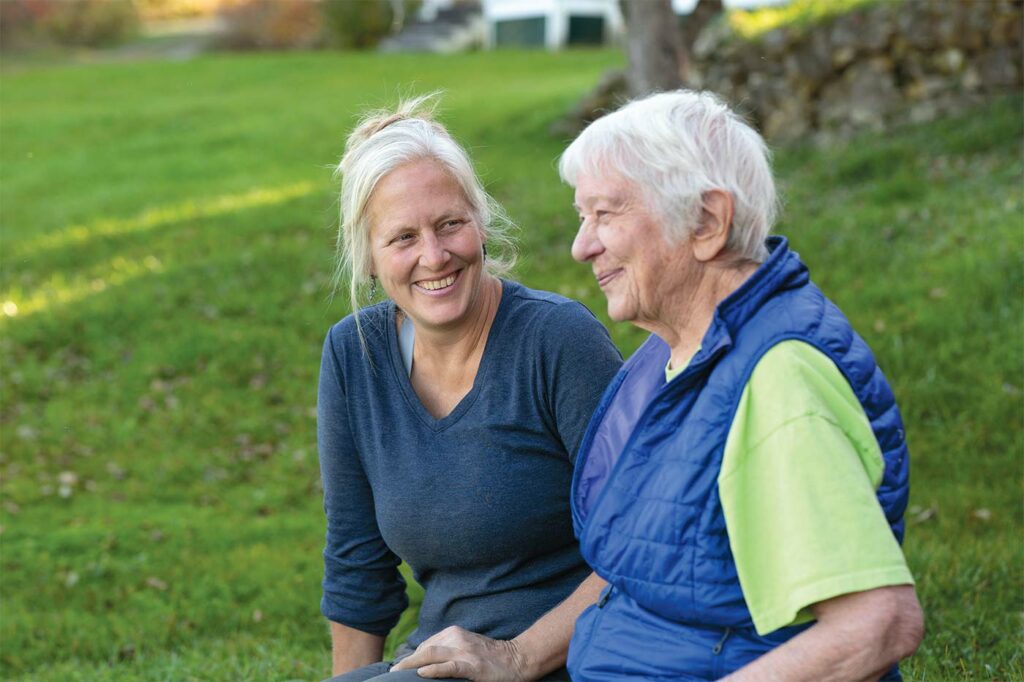
FIELD OF DREAMS
To drive through the farm’s pastures with Mary, at the wheel of her Subaru Crosstrek, is to visit each of her passions, one by one: The dogs (including the last three pups in a litter of 11, born this past summer); the sheep, of course; the 300 trees she planted last spring so that every pasture would have shade; the expansive view, from the farm’s highest elevation, of Monument Mountain to the north and Mount Everett to the south; her herd of 15 Scottish Highlander cows; Grace and Theresa, the bonded horse and donkey that she adopted in August. And then there is Mary’s “Field of Dreams.” It’s a pasture that’s not used for grazing or suitable for hay but that’s nonetheless teeming with life. Bees, butterflies, and birds, including red-tailed and Cooper’s hawks and a resident bald eagle, are at home here. And they are eager pollinators. Mary saw an opportunity to create something that was truly her own. “My mother will tell you that I drove my parents crazy when I was a kid, because we had all these great animals and we had a really nice vegetable garden, and I always wanted to plant flowers,” she says. Lila confirms: “When she was two or three, she’d fill old tires with dirt and plant flowers.”
In that largely unproductive pasture, Mary envisioned peonies bursting with color and fragrance, abuzz with pollinators, and nourished by a plentiful supply of sheep manure. So, in 2021 she got certified for international trade and imported 400 peony roots from Holland to plant in her field. While peonies are expensive, their longevity is impressive. Mary once noticed a peony under a willow tree at the edge of the farm and became curious about its provenance. She asked a longtime resident who had grown up on the neighboring property if she knew where the peony came from. “She said, ‘Yeah, I planted that 47 years ago,’” says Mary. “So that was the peony that invited the others.”
This spring, she had just enough peonies to bring bouquets to the Stockbridge Library. She’s ordered a wide variety to plant in spring 2024, when she expects her original crop to bloom in its full glory. “With peonies, it’s first year sleep, second year creep, third year leap,” she explains. Her ultimate goal: to supply flowers to the local special events market. She may also eventually invite visitors to view the peonies in bloom, choose a root to purchase, and come back in the fall to pick it up. In addition to peonies, she has dahlias (she traded a sweater for 1,000 tubers), viburnum, lilac, hydrangea, dogwood bridal wreath, coral berry, crabapples, pussy willows, and a few hundred winterberry shrubs. “The idea is to have something flowering every season,” Mary says. Anthony, she says, is “very good with plants” and will help tend the Field of Dreams.
While Lila’s farm is now Mary’s farm, there is keen awareness that stewardship is far more important than ownership. “It’s a responsibility,” says Mary. So, yes, she is launching projects that are near and dear to her heart, but doing so in a way that leverages the value of what her mother set in motion 32 years ago. Because Lila didn’t just create a farm, she created an opportunity. “With careful stewardship, if I do the next 10 years very thoughtfully, then there will be another opportunity,” says Mary.
“I’ve had really wonderful jobs where I’ve really tried to make a difference,” she says. “But I was really ready for something new and the opportunity to be outside was very exciting.” —Mary Berle
